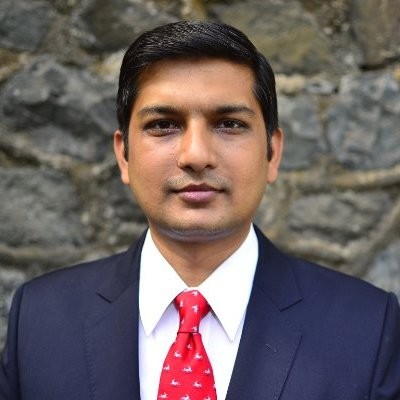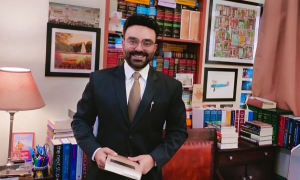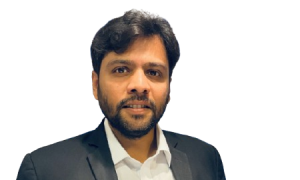This interview has been published by Priyanka Karwa and The SuperLawyer Team

Please tell us about your journey and how you ended up pursuing a career in law?
I am a classic example of the profession finding a person rather than a person actively seeking it out. In 1996, I found myself enrolling at ILS Law College in Pune, not because I had a deep understanding of the legal field or a predetermined plan, but simply because my elder sister was studying law. Little did I know that this seemingly serendipitous decision would set the stage for a remarkable journey.
It was on the first day of my professional life, while working at Hindustan Lever (now Hindustan Unilever), that I experienced a moment of clarity. A senior colleague posed a legal question to me, and as I drew upon my foundational knowledge and connected the dots to provide a meaningful answer, I felt a surge of excitement. It was in that moment that I discovered the exhilaration of applying legal theory to real-world situations.
Since that interesting moment, my journey as a lawyer has been a whirlwind of excitement and fulfilment. Each day presents new challenges, intriguing legal matters, and the opportunity to make a positive impact on the lives of others. Guiding individuals through complex legal cases and providing advisory services has allowed me to contribute to their well-being and shape their future.
Not only that, but I’ve also had the opportunity to shape corporate decision-making, influence individual choices, and even participate in national-level policymaking. Being able to play a role in these important spheres has been truly rewarding.
Reflecting on my journey, I carry a unique perspective as someone who ventured into this field without familial connections or a predetermined path. This perspective, shaped by my experiences, adds a fresh and diverse outlook to my approach as a lawyer.
You have an impressive educational background, including a Bachelor of Civil Law from the University of Oxford. How did this experience shape your career and expertise in the field of law?
My experience studying at Oxford was a transformative journey that taught me important life lessons. When it comes to pursuing education at premier institutions like Oxford, discipline becomes a cornerstone. You’ll find yourself balancing coursework, social activities, extracurriculars, and taking care of your well-being all at once. It may seem overwhelming, but remember, these aspects are interconnected. Embrace the challenge and learn to manage your time effectively. Pay attention to every detail, develop a keen eye, and engage actively in class discussions. This discipline will serve you well beyond your academic pursuits.
Another crucial quality to cultivate is perseverance. The courses, especially the rigorous BCL program, demand unwavering commitment. It’s easy to feel overwhelmed but keep pushing forward. Develop a resilient attitude and maintain a strong sense of determination. Remember, progress requires persistence. The ability to persevere through difficult times will not only benefit your academic journey but also prove invaluable in your future endeavours.
Studying at esteemed institutions like Oxford goes beyond academic knowledge. It fosters adaptability, a skill that will serve you in any profession or sphere of life. You’ll gain a broader understanding of the world and its inner workings, expanding your perspectives and enhancing your problem-solving abilities.
While some may be enticed by tangible benefits such as placements at prestigious law firms, it’s essential to stay true to your aspirations. If your goal, like mine, is to litigate at a specific court, prioritize your path accordingly. Focus on developing the discipline to handle complex cases, irrespective of their scale, and pay meticulous attention to detail. This dedication will build the foundation for a successful and impactful career.
Finally, cherish the opportunities to learn from renowned experts. I was fortunate enough to study competition law under a world-renowned master. The knowledge I gained at Oxford empowered me to apply my skills to real-world cases in the field of competition law. Embrace such opportunities, as they can truly shape your professional trajectory.
Remember, the journey of studying at a premier institution like Oxford offers far more than academic excellence. It imparts essential qualities such as discipline, perseverance, adaptability, and a global perspective. Embrace these qualities, remain true to your aspirations, and seize every opportunity for growth and impact.
As an Advocate on Record at the Supreme Court of India, could you share some insights into the nature of your work and the responsibilities that come with this position?
When assuming the role of an Advocate on Record (AOR) at the Supreme Court, it is crucial to understand the immense responsibility that accompanies it. As an AOR, one must develop strong shoulders to bear this weight of responsibility. Simultaneously, this role helps in advancing one’s legal practice and opens up various opportunities for professional growth and recognition. By shouldering this weight of responsibility, AORs can expand their horizons, gain access to challenging cases, and establish themselves as reputable advocates in the legal fraternity.
One of the primary responsibilities is drafting meticulous pleadings to be filed before the Supreme Court. It is essential to ensure fairness in practice, both towards opposing AORs and counsel, as well as towards the Court and the Registry. Care must be taken not to sign any Special Leave Petition (SLP) or other proceedings in a careless manner. Thorough research of the law is necessary, along with the duty to assist the Court in shaping and developing legal principles. It is important to distil the facts from lower courts and present them clearly and concisely in the pleadings. Remember, written advocacy is just as crucial as oral arguments.
Being an AOR requires long hours of dedicated work. One must have a deep understanding of the facts and present them before the court in a concise manner. It’s important to note that courts usually rely on what is presented before them, whether it is spoken or in writing. Losing the confidence of the court is something every professional wants to avoid.
In simple terms, an AOR is the master of their clients’ cases before the Supreme Court. In situations where the engaged counsel may face difficulties, the AOR must be fully prepared to continue with the matter. Being an AOR is not solely about signing and filing the Vakalatnama, but instead taking full ownership and responsibility for the cases at hand.
With over 22 years of experience in corporate and commercial laws, energy law, infrastructure, and more, what are some of the most interesting cases or projects you have worked on throughout your career?
Over the years I’ve learned that every case is interesting and carries significant importance for the client, regardless of its size or the client’s profile. However, here are some of the many immemorable cases I fought.
Imagine being entrusted with a case early in your career where a client was accused of stealing highly confidential information from their employer. The stakes were sky-high, with damages claimed at a staggering Rs. 1,200 Crores. It was like diving into an intense legal thriller, crafting a compelling defence strategy, and manoeuvring through the twists and turns of the legal battlefield. Witnessing our strategy unfold successfully and delivering a resounding victory was an exhilarating experience.
In another captivating case, I found myself challenging the dominance of a corporate giant, Coal India. The case involved allegations of abuse of power, and the monetary implications were substantial. It was like stepping into the shoes of a legal protagonist, meticulously preparing our arguments, and presenting our case before the Competition Commission of India. I am happy to say that we secured a favourable order.
But it’s not just about the big cases with large financial stakes. Some of the most fascinating moments in my career have emerged from seemingly modest matters. I vividly recall representing a co-generation power producer, fighting to establish fair tariffs, and navigating the complex regulatory landscape. This journey opened my eyes to the intricate technicalities of the power industry and led to a landmark decision that not only shaped policy but also brought about a tangible positive change.
There have been heart-touching encounters in the courtroom where I’ve stood up for ship crews abandoned by their owners. These were stories of resilience and compassion, as we fought to secure their rights and bring them back home. The feeling of making a difference in their lives was immeasurable, and it reminded me of the power of the law to protect the vulnerable.
These anecdotes provide a glimpse into the exciting world of the legal profession, where every case is a story waiting to unfold. I believe in combining my legal expertise with a deep sense of empathy and determination to seek justice.
You have extensive experience in international Arbitrations. Can you provide some examples of the types of arbitration cases you have been involved in, particularly in the areas of EPC projects, energy projects, and shipping?
Here are some examples of the types of arbitration cases I have been involved in, particularly in the areas of EPC projects, energy projects, and shipping:
I have represented clients in an arbitration case before the Singapore International Arbitration Centre (SIAC) involving a claim related to the design of an engineering product. The dispute centred around issues of design defects, performance, and contractual obligations.
In a domestic arbitration matter, I handled a case concerning a power plant construction project. The dispute revolved around delays in the project, resulting in significant damages. My role involved analysing project management issues, contract interpretation, and assessing damages for the delayed completion.
I have been involved in several domestic commercial recovery arbitrations. These cases typically involved disputes between commercial entities seeking to recover financial losses or damages due to breaches of contract, non-payment, or other contractual disputes.
One of the cases I worked on involved the construction of a crane, where issues of alleged design flaws and delays were at the forefront. I focused on establishing liability for the delay damages and quantifying the losses suffered by the client.
In another arbitration case, I handled delays and damages in an HVAC (Heating, Ventilation, and Air Conditioning) project. This dispute required a thorough analysis of project scheduling, performance issues, and assessing damages resulting from the delays.
I also handled an arbitration case related to an EPC project involving the design and construction of a road tunnel and highway. The dispute centred around design issues and delays, and my role involved establishing liability for the delays and quantifying the resulting damages.
In the shipping industry, I represented clients in arbitration matters, including a case involving a dispute regarding the rescue of a crew at sea. This case required an understanding of maritime law, contractual obligations, and assessing damages for the rescue operation.
I have been involved in multiple tariff and regulatory issues concerning power projects, including those involving different sources and capacities. These cases have encompassed a range of issues, such as contract disputes, performance evaluation, and assessing damages in relation to power generation and distribution.
Additionally, I have handled arbitration matters involving disputes related to confidential information. These cases involved protecting sensitive information, analysing confidentiality agreements, and resolving disputes arising from the unauthorized disclosure or misuse of confidential data.
In addition to your legal practice, you have also served as a former Standing Counsel for the State of Uttar Pradesh to the Supreme Court of India and a Law Officer at Hindustan Unilever Limited. How have these roles contributed to your overall professional growth and expertise?
Throughout my professional journey, I have had the privilege of serving in two distinct roles that have significantly contributed to my overall growth and expertise. Firstly, as a Law Officer at Hindustan Unilever Limited (HUL), I had the unique opportunity to learn how to balance the legal requirements of the business with its commercial needs. In this role, I got the opportunity to be involved in conducting legal research, supporting compliance efforts, being in the field with business functions to understand how the company’s business is conducted, being involved in court cases, and assisting in contract review and drafting.
Working with the government and representing it before the Supreme Court of India was another invaluable experience. This role provided me with the platform to present the government’s perspective in court and advocate for its policies. It gave me the chance to dispel misconceptions and demonstrate that the government is not solely focused on wrongdoing but rather strives for the welfare of its citizens. In this role, I was involved in a diverse range of cases, covering a wide spectrum of legal areas. From matters related to irrigation policy, bail applications, and shareholding issues of government enterprises, to constitutional validity challenges against regulations and policies, I gained exposure to a myriad of legal scenarios.
These experiences have instilled in me an important attitude that one cannot afford to be overly technical while advising clients. As lawyers, we must always consider the practical aspects and implications of our legal counsel. Both my roles taught me the significance of understanding the business and governmental context in which legal advice is sought. By bridging the gap between theoretical legal knowledge and real-world applications, I was able to provide comprehensive and practical guidance to my clients.
These roles have allowed me to develop a well-rounded skill set, encompassing a balance between legal considerations and commercial realities, as well as a deep understanding of governmental policies and their implications. I am confident that the diverse range of cases and the holistic approach I have cultivated will continue to contribute significantly to my future endeavours in the legal profession.
Considering your diverse areas of expertise, what advice would you give to aspiring lawyers who are interested in specializing in areas such as arbitration, energy law, or competition law?
If you’re a budding lawyer with a keen interest in specializing in areas like arbitration, energy law, or competition law, here’s some valuable advice for you. Instead of locking yourself into a specific specialization early on, give yourself room to explore different areas of law. Take up diverse opportunities and get a taste of various practice areas. This will give you a broader understanding of the legal world and help you figure out what truly grabs your attention. Keeping an open mind during this exploration phase will allow you to make a well-informed decision when the time comes to choose your specialization.
While theoretical knowledge is important, lack of practical experience is the real deal-breaker. It’s not just about what you learn in textbooks or lectures; it’s about getting your hands dirty in the real world of law. Seek out internships, clerkships, or part-time positions that allow you to roll up your sleeves and immerse yourself in the practical aspects of arbitration, energy law, or competition law. By diving into real-world cases and projects, you’ll gain first-hand experience and discover whether these specialized areas truly resonate with you.
When it comes to choosing your specialization, trust your gut and follow your passion. Think about the areas of law that excite you the most. Consider the kind of impact you want to make and the issues that genuinely ignite your curiosity. Whether it’s fighting for fair resolutions through arbitration, delving into the complexities of energy law, or ensuring a level playing field in the marketplace, pick a specialization that aligns with your authentic interests and values.
Remember, every field of law has its own unique opportunities and challenges. By exploring different practice areas, gaining practical experience, and staying true to your passions, you’ll be well-prepared to make an informed decision about specializing in any field.
In your opinion, what are some of the key challenges that the legal profession faces today, and how can young lawyers navigate these challenges effectively?
One of the significant challenges that young lawyers and even experienced lawyers often face is the collection of fees for their legal services. This issue can have a profound impact on their professional and personal lives. However, they are generally discussed behind closed doors due to the attached stigma. Fee collection can be a complex and time-consuming process, leading to financial strain and affecting their mental well-being.
Many lawyers find themselves grappling with the task of chasing down payments from clients. This can involve spending valuable time and resources in follow-ups and negotiations, which can be frustrating and demanding. Furthermore, some clients may be reluctant or unable to pay, resulting in additional complications and financial instability for the lawyer.
In fact, understanding the importance of addressing this challenge, I have taken the initiative to create awareness and find solutions for effective fee collection. I have started a campaign or movement that aims to shed light on the significance of timely and transparent fee collection in the legal profession. By fostering open discussions and providing a platform for fellow professionals to share their experiences and concerns, we strive to create a supportive environment within the legal community.
Another significant challenge is the misconception that a deep understanding of the law alone is sufficient for being a successful lawyer. While legal knowledge is essential, practical advocacy skills require a blend of psychological intelligence, creativity, and real-world experience. Many young lawyers are initially shocked by the harsh practical reality, which may lead to feelings of dejection. However, it is crucial for them to embrace these challenges as opportunities for growth, understanding that trial and error is a valuable part of the learning process. Letting go of the mentality of striving for perfection or the typical topper syndrome is essential. Young lawyers should focus on continuous improvement and be willing to learn from their experiences.
With the constantly evolving legal landscape, particularly in areas such as data protection laws and competition law, how do you stay updated with the latest developments and ensure that your expertise remains relevant?
When it comes to staying updated with the constantly evolving legal landscape, in any field I believe the following helps:
Stay informed through extensive reading: Develop a habit of reading extensively, including legal journals, blogs, and other relevant resources. The more you read, the better equipped you’ll be to understand the latest developments and gain valuable insights.
Engage in discussions: Seek opportunities to engage with like-minded individuals. Participate in discussions with such people. Never shy away from clearing doubts and seeking clarification from experienced professionals in the field. Engaging in discussions and networking with like-minded individuals will further enhance your understanding and broaden your perspective.
Embrace continuous learning: Treat learning as an ongoing process. Attend conferences, seminars, and workshops to learn from industry leaders and gain insights into emerging trends, case studies, and practical applications.
Harness online resources: Take advantage of the digital world. Explore online legal databases, research portals, and reputable websites that provide real-time updates and relevant insights. These resources are easily accessible and can provide you with a wealth of information to stay current.
Finally, looking back at your successful career, what are some of the personal values or principles that have guided you along the way, and how have they influenced your approach to practicing law?
When reflecting on my fulfilling career, I attribute much of it to the personal values and principles that have guided me along the way. These principles have shaped my approach to practicing law, and I believe they can be beneficial to aspiring lawyers as well.
First and foremost, I have always embraced the power of grit and a strong work ethic. These qualities have been the driving force behind my actions, allowing me to overcome challenges and persevere in the face of adversity. As a first-generation lawyer, I learned early on the importance of hard work and determination in carving my own path.
Integrity is another principle that has been central to my practice. I firmly believe in keeping my integrity on track, as it serves as the foundation for trust and credibility. Integrity; like salt, may not always be noticed when it is present, but its absence will undoubtedly be discussed. By upholding the highest ethical standards, I have built lasting relationships with clients and colleagues based on trust and respect.
Persistence and self-belief have also played a significant role in my journey. There have been moments when the results of my efforts were not immediately evident. But by maintaining persistence and a thirst for self-improvement, we can achieve remarkable growth and reach new heights.
Believing in oneself and having confidence is key to thriving in the legal profession. While external validation may offer a temporary boost, true success comes from within. Treating each matter with due diligence, regardless of its size, and keeping the clients’ best interests in mind have been guiding principles for me. Recognizing the impact of a case on the lives of those involved allows me to approach each situation with the necessary care and dedication.
As a first-generation lawyer, I have learned to view competition as an opportunity for growth rather than a threat. I have studied the positive attributes of talented individuals in my field and used them as inspiration to enhance my skills. I firmly believe that there is always room at the top of the pyramid for those who dare to dream big. Breaking through glass ceilings and challenging perceived limitations is not only possible but necessary for personal and professional advancement.
As you embark on your own journey in the legal profession, particularly as a first-generation lawyer, my advice to you is to embrace these principles. Let grit, integrity, persistence, self-belief, and a healthy approach to competition guide your path. And remember, as a first-generation lawyer, you possess a unique perspective and strength that can drive you to excel. By incorporating these values into your practice, you will not only achieve success, but you will also make a lasting impact in the lives of your clients and contribute to the advancement of the legal field.

























